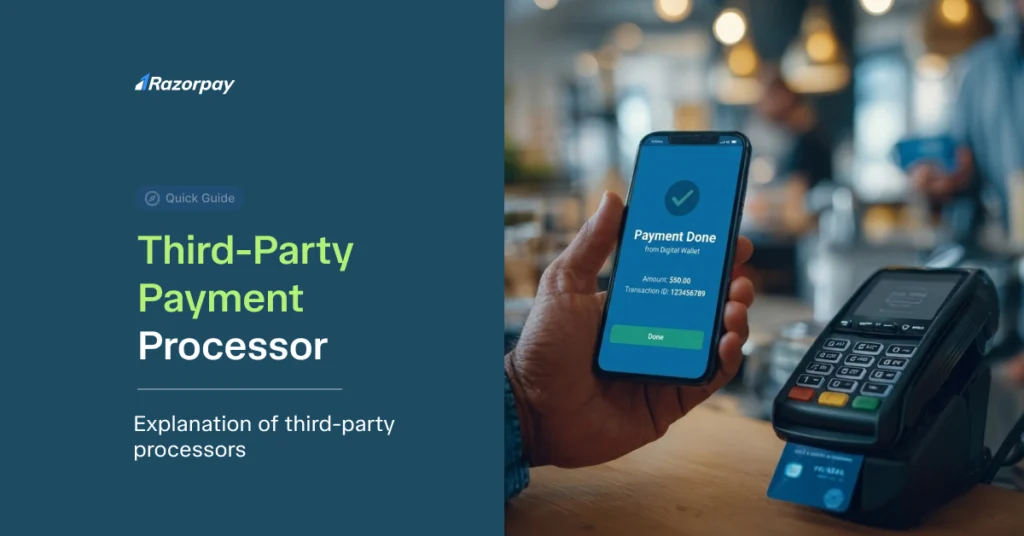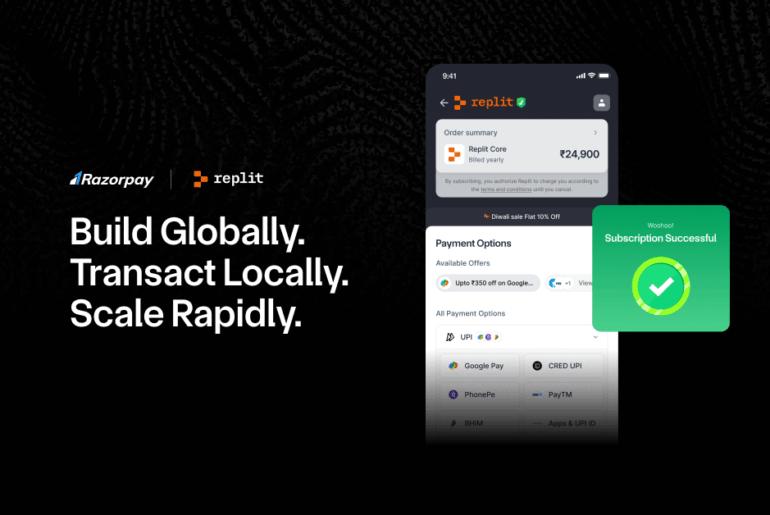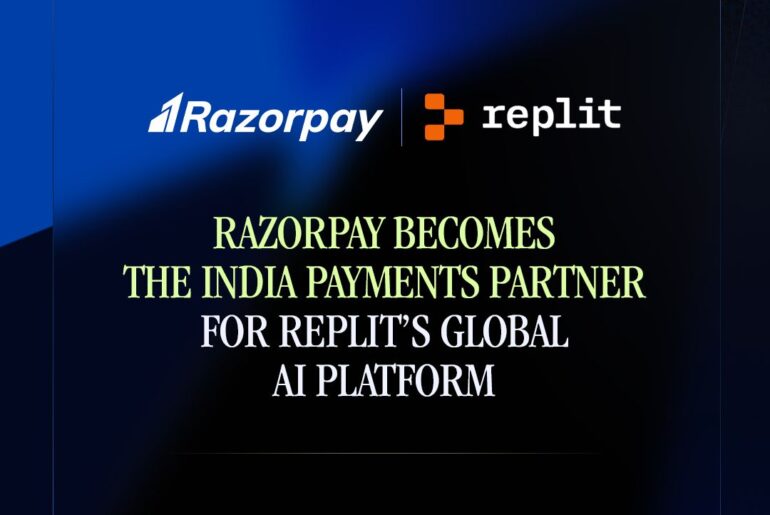Imagine you run an online store. People come to your website, add items to their cart, and are ready to pay. But sending and receiving money online isn’t as simple as it looks — it involves banks, card companies, and multiple security checks. That’s where a third-party payment processor helps.
It’s a company that safely moves money from your customer’s account to your business account. You don’t need to deal with banks or manage the technical setup — the processor takes care of everything for you. Without such payment processors, paying online would be slow and confusing, often leading to frustrated customers and abandoned carts.
This is where a robust and efficient payment gateway becomes indispensable. Using a reliable partner like Razorpay, for instance, means you don’t have to worry about the technical side of payments. It simplifies the entire process, letting you accept UPI, cards, and digital wallets through one simple setup.
Key Takeaways
Third-party payment processors make online payments simpler by managing all communication between banks, card networks, and merchants
They save time and reduce costs since businesses don’t need to set up direct bank integrations or manage complex systems.
Security is built in, with PCI DSS compliance and fraud prevention measures keeping transactions safe.
Razorpay provides a single platform that includes payment processing, subscription management, and Smart Collect, making it easier for businesses to accept payments and manage collections smoothly.
What is a Third-Party Payment Processor?
A third-party payment processor is a financial service provider that manages digital transactions between your business, your customers, banks, and card networks.
In India’s fast-growing digital economy, these processors play a crucial role. Its the bridge that moves money safely from your customer’s account to your business account. These processors make digital payments quick, secure, and hassle-free — especially for small businesses that may not have the setup to handle banking and compliance directly.
Here’s what third-party payment processors do:
- Authorise payments: When a customer tries to pay, the processor checks whether their card or UPI account details are correct and if enough money is available. This step helps avoid failed or fake transactions before any money actually moves.
- Communicate with banks: Once the payment is verified, the processor talks to both the customer’s bank and your business’s bank. It passes information back and forth quickly so that payments are approved within seconds.
- Manage settlements: After a successful transaction, the processor takes care of transferring the money to your business account. It makes sure the right amount is deposited, records the transaction, and provides a clear summary so you can track your earnings easily.
- Provide compliance and fraud checks: Processors follow all RBI regulations to keep transactions safe. They also use fraud detection tools to identify any unusual activity, such as repeated failed attempts or suspicious card usage, protecting both you and your customers.
Did You Know?
The global payment processor market is projected to reach USD 103.63 billion by 2030.
How Do Third-Party Payment Processors Work?
- Customer initiates the transaction: First, your customer selects a payment method, such as UPI, a credit or debit card, or a digital wallet, and enters the required details to make the payment. This starts the payment process.
- Processor encrypts and sends data to the bank: The payment processor then securely encrypts the transaction information and sends it to the customer’s bank. This ensures that sensitive data, like card numbers or UPI PINs, stays protected.
- Bank authorises or declines the payment: The customer’s bank checks if the account has enough funds and verifies the payment details. It then either approves the transaction or declines it if something is wrong.
- Processor settles funds to the merchant: Once the bank approves the payment, the processor moves the funds to your business account. This final step completes the transaction, ensuring you receive the money quickly and securely.
Platforms like Razorpay make this process even more efficient. Payments can be settled in real time, so you don’t have to wait for days to access your funds. On top of that, Razorpay offers detailed analytics, allowing you to monitor transactions, track trends, and manage your business finances effectively.
Why Do Businesses Use Third-Party Payment Processors?
- Multi-mode acceptance: Businesses can accept payments from many different sources in one place, including UPI, credit and debit cards, Buy Now Pay Later (BNPL) options, and digital wallets. Customers get more ways to pay, which makes it easier for them to complete a purchase.
- Quick setup: Setting up payments directly with banks can take weeks because of paperwork, approvals, and integration. A third-party processor lets you start accepting payments in a few hours or days, saving a lot of time.
- Compliance & security handled: The processor ensures that all transactions follow RBI rules, keeps customer payment information secure, and detects any suspicious or fraudulent activity. You don’t have to worry about managing security yourself.
- Boosts checkout success rates: Payment processors optimise the payment process so that transactions are less likely to fail. This reduces abandoned carts and increases the chances that customers complete their purchases.
Razorpay payment gateway, along with Smart Collect, lets businesses accept payments from multiple modes smoothly. Payments are tracked automatically, reconciled quickly, and reported in real time, reducing errors and saving effort.
Pros and Cons of Working with a Third-Party Payment Processor
Pros:
- Faster go-to-market: With a third-party processor, you can start accepting payments quickly without spending months on complex bank integrations, security checks, or regulatory approvals. This allows your business to go live faster and reach customers sooner.
- Access to multiple payment modes in one platform: These processors let you accept a wide range of payment options, such as UPI, debit and credit cards, wallets, and net banking, all from a single platform. This convenience makes it easier for your customers to pay in their preferred way.
- Built-in fraud detection and compliance: Third-party processors take care of security, fraud prevention, and compliance with government regulations, so you don’t have to manage these technical or legal challenges yourself.
- Transparent settlements and analytics dashboards: You can monitor all your transactions, track payment trends, and manage cash flow efficiently through detailed, real-time analytics dashboards.
- Scales easily with business growth: As your business grows and transaction volumes increase, the processor can handle the extra load without requiring additional technical setup or resources from your side.
Cons:
- Processing fees per transaction: Most third-party processors charge a small fee on each payment. While manageable for small volumes, this can become significant as your transactions grow.
- Dependency on third-party uptime: Since your payments rely on the processor’s system, any downtime on their end can temporarily halt transactions, potentially affecting customer experience.
- Limited control compared to direct bank relationships: You have less control over settlement schedules, payment policies, and technical operations than if you handled payments directly with banks.
- Possible restrictions on certain high-risk industries: Some sectors may face limitations due to regulatory or risk concerns, meaning not all businesses can use the processor for every type of payment.
Platforms like Razorpay help reduce these drawbacks. With 99.9% uptime, transparent pricing, and comprehensive compliance coverage, Razorpay ensures that businesses can enjoy the benefits of a third-party payment processor while keeping risks and limitations under control.
Benefits of Using a Third-Party Payment Processor
For Businesses:
- PCI DSS compliance: Payment processors follow strict security rules called PCI DSS standards, which are designed to keep card and payment information safe. This means businesses don’t have to store or manage sensitive customer card details themselves, reducing the risk of fraud or data breaches.
- Lower complexity: Instead of integrating with multiple banks, maintaining compliance, and monitoring for fraud, the processor takes care of all these technical and regulatory tasks. This saves time and effort for your team.
- Access to new payment methods: By using a processor, you can easily offer multiple payment options such as UPI, credit and debit cards, wallets, and BNPL. This helps attract more customers who prefer different ways to pay.
For Customers:
- Smooth checkout: The payment process is designed to be quick and reliable. Payments are processed without errors, so customers can complete their purchases without getting stuck or frustrated.
- Multiple options: Customers can pay in the way that suits them best. Whether they prefer UPI, credit or debit cards, digital wallets, or BNPL options, they have flexibility.
- Faster transactions: Payments are verified and completed almost instantly. Customers don’t have to wait for long confirmation times or worry about delays. This speed makes the buying experience seamless and keeps customers satisfied.
Did You Know?
Merchants using Razorpay witnessed about 30% more customers completing their purchases at checkout.
Challenges Without a Third-Party Processor
- Direct bank integration required: You would need to connect with each bank individually, which involves complex technical setups and ongoing maintenance.
- Compliance burden: Managing regulatory requirements like KYC, PCI-DSS, and RBI guidelines falls entirely on your business, increasing both time and effort.
- Higher fraud risk: Without the security tools that processors provide, your transactions are more vulnerable to fraud and cyber threats.
- No unified reporting: Payments from different banks, cards, or wallets would be tracked separately, making it harder to monitor cash flow or analyse trends.
Platforms like Razorpay solve these challenges by offering a single integrated platform. It handles bank connections, ensures compliance, protects against fraud, and provides real-time analytics and unified reporting, so you can manage all your payments efficiently in one place.
Best Practices When Choosing a Processor
- PCI DSS compliance: Ensure the processor follows global security standards to protect sensitive payment data, reducing the risk of fraud and data breaches.
- Multi-mode acceptance: Choose a processor that supports multiple payment options such as UPI, cards, wallets, and net banking, so your customers can pay in the way they prefer.
- Transparent pricing: Look for clear, upfront pricing without hidden fees, so you know exactly what you are paying for every transaction.
- Analytics dashboards: The best third-party payment processor should provide real-time reporting and dashboards that help you track transactions, manage cash flow, and analyse customer behaviour.
Ready to streamline your payments?
FAQs
What’s the difference between a payment gateway and a processor?
A payment gateway is the interface that captures customer payment information on your website or app. The payment processor is the system that handles the actual movement of money between the customer’s bank and your business account.
Are third-party processors safe?
Yes. Reputable processors follow strict security standards like PCI DSS and implement fraud detection, encryption, and compliance measures to protect both businesses and customers.
Do small businesses need third-party payment processors?
Absolutely. For small businesses, using a processor simplifies online payments, reduces technical and compliance burdens, and allows them to accept multiple payment methods.
How does Razorpay work as a processor?
Razorpay works as a processor by handling payments between customers, banks, and merchants. It verifies transactions, manages settlements, ensures security and compliance, and allows businesses to accept multiple payment methods through a single platform.
What are the costs involved in using a third-party payment processor?
Most third-party processors charge a small fee for each transaction. This fee usually covers payment processing, security, and compliance services.



